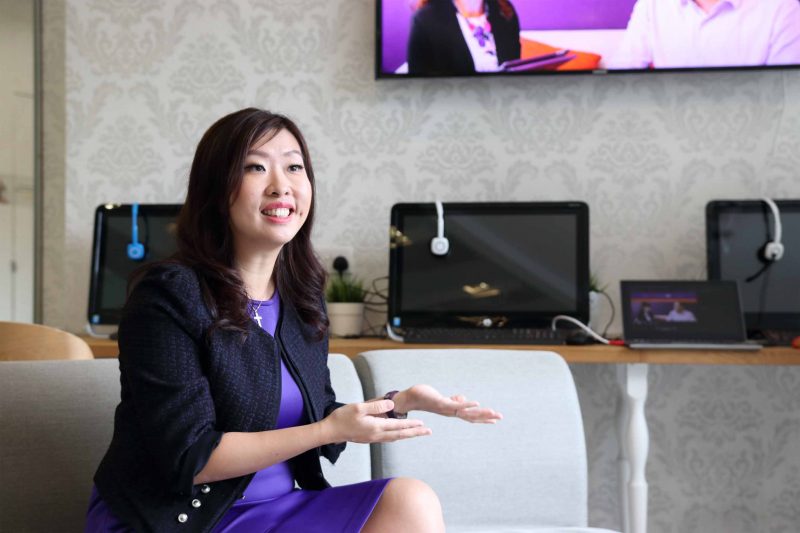Staying In Focus with…Violet Lim
Violet Lim is an advocate of finding love. Through the dating service she co-founded, she and her team have arranged over 100,000 dates across South East Asia. Here, she talks about running the business of finding love within the Southeast Asian region.
According to co-founder and CEO of dating service Lunch Actually, Violet Lim, there are more women than men when it comes to offline matchmaking. ‘And we see this trend not just in Malaysia, but in other countries in which we’ve presented as well. For women, security’s very important and they generally prefer offline matchmaking as well as personalised service, instead of online dating or dating apps,’ Lim declares. ‘Generally, I find that women are more open to using a dating service to find love, as they are also more actively seeking a serious companion.’

37-year old Lim, a mother of two young children, knows what she’s talking about. Since its inception in 2004, dating service Lunch Actually has grown exponentially through acquiring matchmaking brands such as Singapore dating app Love Out Loud Asia in 2014, Thailand’s MeetNLunch the year after and the most recent, Indonesian Setipe in 2017. Today, it operates in Malaysia, Singapore, Thailand, Indonesia and Hong Kong.
Lim left a stable corporate job to start Lunch Actually. It sounds like a flighty move, in fact, her parents thought so at the time. What made her do this was the realisation that her extremely eligible and attractive banker colleagues were still single and it was because they were working long hours. ‘They were virtually married to the bank. When I came across the concept of lunch dating, I was immediately attracted to the idea because I felt that lunch was “short, sweet and simple” – long enough for you to get to know someone, yet short enough not to become awkward,’ the modern-day matchmaker explains. ‘It’s not just a business of making money but making a difference in people’s lives by helping them find life-long happiness.’
Lessons learned
After more than a decade of being in business, Lim learnt three main lessons:
Management: ‘When I first started out, like any new manager, I wanted to be everyone’s best friend. That didn’t work out well because it’s hard to be both someone’s supervisor and best friend at the same time. After that, I decided to draw a hard line that work is work with my associates but that also didn’t work out well eventually,’ she says ruefully. ‘Since then, I’ve found a management style that’s comfortable for me and balances between the two. You need to be firm but at the same time be able to relate to the people you’re working with. It works, and as a result, I’ve also seen a tremendous growth in the company.’
Learning to trust and delegate is important: ‘With Lunch Actually being in several countries, I definitely can’t be in five different countries at the same time. What I’ve learned is that we all have to start from somewhere. While it may be faster for me to do something by myself, that’s also because I’ve the experience to do so. If I’m unwilling to give other people the chance to learn and gain those experiences themselves, the company would never grow to be in five countries,’ says Lim. ‘By delegating tasks to my associates in all countries and training them to be better at their job scopes, I also have the time to learn and challenge myself more. I also find myself learning from them. Entrepreneurs must be able to nurture talent.’
Mistakes are inevitable but are valuable lessons with key takeaway messages: ‘If I were to look back at my journey as an entrepreneur, I’m sure there have been many past mistakes. However, I believe that entrepreneurs should always be prepared to make intelligent risks or else become stagnant,’ she advises. ‘What others may see as “mistakes”, I see as learning opportunities. I’m happy they happened and I’m sure they helped me become the person I am now, as well as helped me grow the business to what it is today.’
Differences between the countries
Lunch Actually may be currently based in Asian countries but they’re fairly different in a number of ways. Lim, a Malaysian living in Singapore, lists down three main differences between them:
‘In Singapore, Lunch Actually is an accredited dating company by SDNTrust under the Ministry of Social and Family Development. This accreditation is a sign of trust from the government that Lunch Actually continually strives to attain high standards of professionalism and service delivery to singles,’ Lim explains. ‘This kind of support has certainly assured many of our clients, leading them to trust us with their love lives. Another great thing is that we work with the government to run marriage checks for all our potential member – to ensure that every member is legally single.’
Generally, Lim feels that dating companies have become more accepted in recent years, especially in Asia. However, responsiveness and openness to dating companies vary from country to country. ‘In Singapore alone, I’m glad to say that public perception of dating companies has become more positive compared to when I first started and had trouble trying to get an office, as the landlord had reservations about having a dating company as a tenant. Back then, Singaporean newspapers didn’t want us to advertise in the main paper, only in the classifieds section,’ she recalls.
Lim believes that more can be done to improve openness towards dating companies everywhere. ‘In Jakarta, for instance, there’s more than we can do to educate the singles that it’s ok to outsource their dating life to a professional,’ she says.
Lim also observes how differing cultures dictate the way people date. ‘As a dating company, we have to be prepared for these differences that impact the way we run our business. For example, in fast-paced Singapore or Hong Kong, people tend to make decisions faster. So, they’re more likely to decide not to go on a second date with the same person because they just feel that it didn’t work on the first date. But in Malaysia, they’re more willing to give it a chance and go on a second or third date to see whether there might be chemistry eventually. We do encourage people to do that because it’s rare for love at first sight to happen.’
A lucrative business
‘Oh wait! I wouldn’t say the dating industry is a “lucrative” business. In fact, it’s a very personal business with a lot of ups and downs,’ Lim makes clear. ‘But I’d say that the dating industry is now more accepted by society as a legitimate way to meet your other half. Along with other societal changes like more singles delaying marriage, higher divorce rates, acceptance of dating apps, and so on, professional dating companies have now gained traction as respectable and self-sustaining businesses. It also has no “off-peak” season as singles desire love and companionship throughout the year.’
After more than a decade, Lim reveals three fundamental things that keep a business going successfully:
1. As a leader, you’ve to have the drive and passion to succeed. From this drive arises your willingness to put in the necessary hours, find solutions faster and learn from necessary people to ensure your business achieves the kind of success it deserves.
2. You must be willing to take intelligent risks. Many businesses get stalled in this as they are so against risk-taking or incurring new costs so as to maintain that security blanket against failure. While many of them may not fail, many also don’t get much tractions and leverage to grow much as well. But taking risks have to tempered with sound judgment to know which risks have higher chances of success versus which risk is a simple fallacy. It’s however difficult to differentiate these risks and sometimes you just have to learn from failure and mistakes. It’s just part of the journey.
3. You must be able to nurture talent. All the top entrepreneur formed powerful teams around them to get where they are. An entrepreneur must learn how to manage, motivate and inspire their team to do their best.
Empowering women entrepreneurs today
‘I believe female entrepreneurs should use their strengths to their advantage. We can leverage our communication and interpersonal skills. I’d also encourage women entrepreneurs to stay hungry, driven and focused on your goals as well as persevere through challenges. Cut out the noise that’s negative towards you, especially about your gender,’ she stresses. ‘I also believe that women entrepreneurs should open up, share their stories in business, mentor and support other women entrepreneurs. We all need role models and mentors. It’s uplifting to personally see glass ceilings get broken. I look forward to mentoring younger women entrepreneurs as well, and encourage them towards success.’
Last words
‘Honestly, I don’t think there’s anything I’ll do anything differently if I can live my life over again. Even the negative events in my life have shaped me to become the woman I am today. I’m thankful for my great supporters, especially my family members and my great team at Lunch Actually. I look forward to what the future brings and achieving our goal of a million happy marriages.
